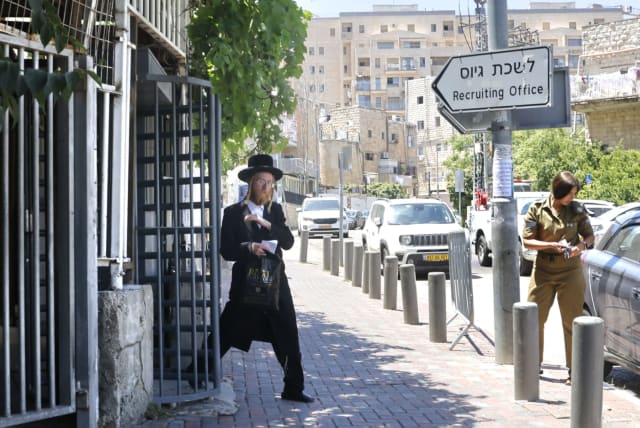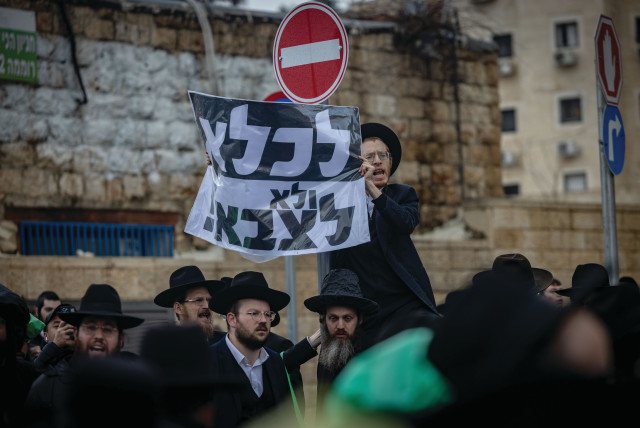High Court unanimously rules against exemption for haredim in IDF

Likud: Peculiar that the High Court is forcing ultra-Orthodox conscription • Ruling also calls to freeze funding of yeshivas who do not comply
A full extended nine justice panel of the High Court of Justice on Tuesday ordered a full draft of haredim into the IDF and the freezing of all funds for institutions which do not comply starting as of April 1.
The court said that it had been patient on the issue for decades and then most recently had given the government all sorts of extensions since invalidating the last government haredim-exemption law in June 2023, but that time had run out.
The blockbuster ruling could lead to new elections, or if not, a seachange in the political landscape on the issue of haredim in the IDF.
If the government and Knesset have been working slowly on the issue for months and years, hoping to stall a crisis, the pressure on Haredi MKs and on the government to arrive at a solution to restore their funding just jumped significantly.
Curiously, it seemed that the High Court's decision applied immediately, though its April ruling had left room for a delay to some freezing of funds until August 8.
Within hours of the ruling, Deputy Attorney General Gil Limon called for immediate implementation of the High Court ruling with the drafting of 3,000 haredim above and beyond the 1,000 plus haredim who have been drafted in recent years, the number which the IDF said it could be immediately prepared to absorb at a hearing earlier in June before the court.
In a letter to the Defense Ministry, the Finance Ministry, and the |Education Ministry - the key ministries involved in drafting or financing haredi schools - he called for "the defense establishment to act immediately to implement the ruling for the recruitment of yeshiva students, those required to serve in the military, according to the needs of the army and its capabilities."
He also said that the IDF should immediately present a plan for drastically increasing Haredi recruitment.
Estimates are that some thousands of haredim each year do not spend most of their time studying in Yeshiva, such that those who do study in Yeshiva would not necessarily need to be drafted at this stage.
There were some hints that the Court would issue a major ruling since at a hearing earlier in June this month, the justices had come out swinging.
Part of what had been so surprising about the hearing was that three of the most conservative voices - Justices Noam Sohlberg, Alex Stein, and Yael Wilner – were among the roughest and most aggressive critics of the government.
Inside the court hearing
Sohlberg was furious that the IDF had offered as a minimum initial measure to take in 3,000 haredim out of over 60,000 eligible draftees over the course of the 2024 recruitment class, and that the government even refused this.
Stein and Wilner laid waste to the government’s legal claims that mid-level IDF officers could have wide discretion to give broad exemptions to haredim from military service, even beyond specific individual extreme extenuating circumstances.
In rare moments, one could tell that the justices were emotionally disturbed by the idea that during an ongoing war which has taken the lives of around 1,500 Israelis, haredim still feel that asking them to do the same service is oppression.
When a Haredi man at the hearing vowed that the haredim he knew would rather die than be drafted, it seemed to ring hollower with the justices mid-war than in the past.
If in the past, such statements had a shock value which made most Israelis who do serve in the IDF hold their heads in shock, and decide to move on because the difficulty of negotiating with such a stubborn sector of the country was too great, the war seemed to have changed the atmosphere in the court building.
In comical moments, Acting Chief Justice Uzi Vogelman (“acting” because Justice Minister Yariv Levin has blocked Yitzhak Amit from taking office since October 2023) told the government’s lawyer that in trying to sound coherent and reasonable, he had essentially adopted the arguments of both Attorney-General Gali Baharav-Miara and the NGOs, led by the Movement for the Quality of Government in Israel, who brought the petition to draft haredim.
There seemed to be no question where the court was going with this – only how far.
In late March, the court froze one third of some of the government-sponsored funds for the around 1,750 Haredi Yeshivot. But this did not impact the vast majority of the over 60,000 haredim in play for IDF or national service, only a portion of the recent draft class.
It also did not impact significant non-government funds which the Haredi institutions raise.
While Haredi advocates have talked about the reduction in funds as being a life and death issue, there has not seemed to be any evident push by their Knesset officials to reach a new compromise either in the government or in Knesset hearings on the issue, which started last week, but with no noticeable progress.
The Haredi political parties seemed to have judged that most of their government funding would not be touched any earlier than August or Tuesday's ruling.
The haredim also knew that they could somewhat freeze the current situation by going to new elections.
In early June, it seemed like the High Court was leaning toward ordering the government and the IDF to immediately draft a minimum of 3,000 new Haredi IDF recruits.
This would not have been insignificant, but it would still have been less than 25% of the current Haredi recruitment class, and would not have touched any of the older classes.
With the High Court's Tuesday ruling, now the question will be whether the IDF, haredim, or political class will move faster, and whether the fight will focus more on recruitment and arresting though who refuse (which is only possible up to a limited number of persons) or to the fight over funding.
Jerusalem Post Store
`; document.getElementById("linkPremium").innerHTML = cont; var divWithLink = document.getElementById("premium-link"); if (divWithLink !== null && divWithLink !== 'undefined') { divWithLink.style.border = "solid 1px #cb0f3e"; divWithLink.style.textAlign = "center"; divWithLink.style.marginBottom = "15px"; divWithLink.style.marginTop = "15px"; divWithLink.style.width = "100%"; divWithLink.style.backgroundColor = "#122952"; divWithLink.style.color = "#ffffff"; divWithLink.style.lineHeight = "1.5"; } } (function (v, i) { });

